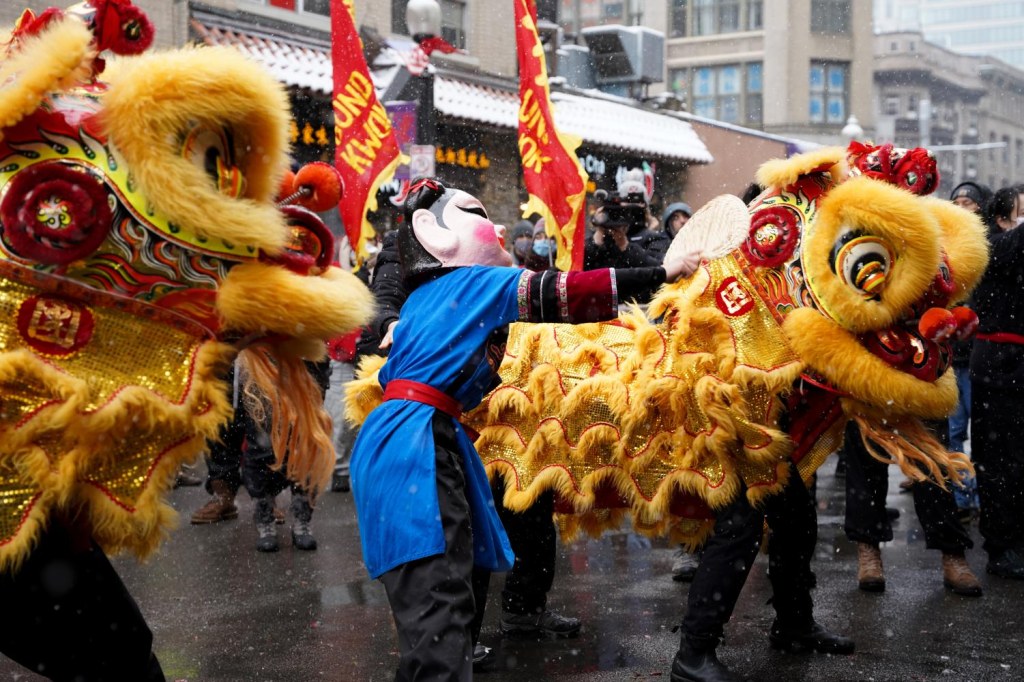Experience The Mesmerizing Boston Chinatown Lion Dance: Unleash The Power Of Tradition And Culture With A Click To Action!
Boston Chinatown Lion Dance: Preserving Tradition and Celebrating Culture
Introduction
Welcome, Lions Enthusiasts, to a vibrant celebration of culture and heritage – the Boston Chinatown Lion Dance. This mesmerizing and awe-inspiring traditional Chinese performance has captivated audiences for centuries, and it continues to thrive in the heart of Boston’s Chinatown. In this article, we will explore the significance, history, and the captivating elements that make the Boston Chinatown Lion Dance a must-see spectacle.
1 Picture Gallery: Experience The Mesmerizing Boston Chinatown Lion Dance: Unleash The Power Of Tradition And Culture With A Click To Action!

Let us dive into the rich tapestry of this ancient art form and discover why it holds a special place in the hearts of both the local Chinese community and visitors from around the world.
What is the Boston Chinatown Lion Dance?

Image Source: thescopeboston.org
The Boston Chinatown Lion Dance is a traditional Chinese dance characterized by performers mimicking the movements of a lion. It is believed to bring good luck, fortune, and ward off evil spirits. The dance is usually performed during festive occasions, such as Lunar New Year celebrations, grand openings of businesses, and cultural festivals.
The lion dance is a unique blend of martial arts, acrobatics, and dance, accompanied by the rhythmic beats of drums, cymbals, and gongs. The elaborate lion costumes, adorned with vibrant colors and intricate designs, add to the spectacle and make it a visually captivating experience for spectators.
🦁 The Boston Chinatown Lion Dance represents the vibrant spirit and cultural heritage of the Chinese community, serving as a powerful symbol of unity, prosperity, and protection for the community and the businesses it blesses.
Who Performs the Lion Dance?
The lion dance is performed by a team of highly skilled dancers who undergo rigorous training to master the intricate movements and coordination required for the performance. These dancers are often members of martial arts schools or lion dance troupes within the local Chinese community.
👥 The performers work in pairs, with one person controlling the head and movements of the lion, while the other manipulates the lion’s tail. The team’s synchronization and agility create the illusion of a majestic and lively lion in motion.
When and Where Does the Lion Dance Take Place?
The Boston Chinatown Lion Dance is commonly seen during important occasions such as the Lunar New Year celebrations, which usually take place between January and February each year. The dance is also performed during other cultural festivals and significant events within the community throughout the year.
📅 The exact dates and locations of performances can vary, so it is advisable to check with local community organizations or event calendars to ensure you don’t miss out on the opportunity to witness this spectacular display of Chinese culture.
Why is the Lion Dance Important?
The Boston Chinatown Lion Dance holds deep significance for the Chinese community in Boston and beyond. It serves as a tangible connection to their ancestral roots, preserving cultural traditions and passing them on to future generations.
🎎 The lion dance is believed to bring good luck, fortune, and prosperity to businesses and households. It is also a symbol of strength, courage, and protection, warding off evil spirits and bringing harmony to the community.
How is the Lion Dance Performed?
The lion dance involves a series of coordinated movements and gestures that require immense strength, agility, and precision from the performers. The dance begins with the awakening of the lion, symbolizing the lion’s transition from sleep to life.
🎭 Throughout the performance, the lion interacts with various props and obstacles, such as large balls, lettuce, and firecrackers. Each element represents different aspects of Chinese culture and tradition, adding depth and meaning to the overall performance.
Advantages and Disadvantages of the Boston Chinatown Lion Dance
Advantages:
1. Cultural Preservation: The lion dance helps preserve the rich cultural heritage of the Chinese community, ensuring that traditions are passed down to future generations.
2. Festive Atmosphere: The lion dance adds vibrancy and excitement to festivals and celebrations, creating a joyful and memorable experience for attendees.
3. Business Blessings: The lion dance is believed to bring good luck and prosperity to businesses, making it a popular choice for grand openings and special events.
Disadvantages:
1. Accessibility: The lion dance may not be easily accessible to those outside of the Chinese community, limiting exposure and understanding of this traditional art form.
2. Cultural Appropriation: In some instances, the lion dance has been commercialized and used inappropriately, diluting its cultural significance and misrepresenting its true meaning.
3. Limited Performances: The lion dance is primarily associated with specific festivals and cultural events, which means it may not be readily available for viewing throughout the year.
Frequently Asked Questions (FAQs)
1. What is the significance of the lion dance in Chinese culture?
The lion dance is considered a symbol of good luck, fortune, and protection in Chinese culture. It is believed to bring prosperity to businesses and ward off evil spirits.
2. How long does a typical lion dance performance last?
The duration of a lion dance performance can vary depending on the occasion. It can range from a few minutes to several hours, depending on the complexity of the performance and the event itself.
3. Can anyone join a lion dance troupe?
While anyone can express interest in joining a lion dance troupe, it typically requires significant commitment, training, and understanding of Chinese culture and traditions.
4. Are there any regional variations of the lion dance?
Yes, there are regional variations of the lion dance throughout China and other Asian countries. Each variation has its unique characteristics and styles, reflecting the diversity of Chinese culture.
5. How can I support and learn more about the Boston Chinatown Lion Dance?
To support and learn more about the Boston Chinatown Lion Dance, consider attending local festivals and cultural events where the dance is performed. You can also connect with local community organizations and lion dance troupes to inquire about their activities and ways to get involved.
Conclusion
In conclusion, the Boston Chinatown Lion Dance is not just a performance; it is a celebration of heritage, culture, and community spirit. This ancient tradition showcases the beauty and artistry of Chinese culture, capturing the hearts and imaginations of all who witness it.
✨ We encourage you to embrace diversity, immerse yourself in different cultures, and support local traditions like the Boston Chinatown Lion Dance. Attend performances, engage with the community, and be part of an experience that transcends borders and brings people together in celebration.
Final Remarks
It is important to acknowledge and respect the cultural significance of the Boston Chinatown Lion Dance. This article aims to provide insight and appreciation for this traditional art form. We encourage readers to support the preservation of cultural heritage and engage in meaningful cultural exchanges.
🙏 Thank you, Brave Readers, for joining us on this journey into the world of the Boston Chinatown Lion Dance. We hope this article has inspired you to explore and celebrate diverse cultural traditions.
This post topic: Lions



